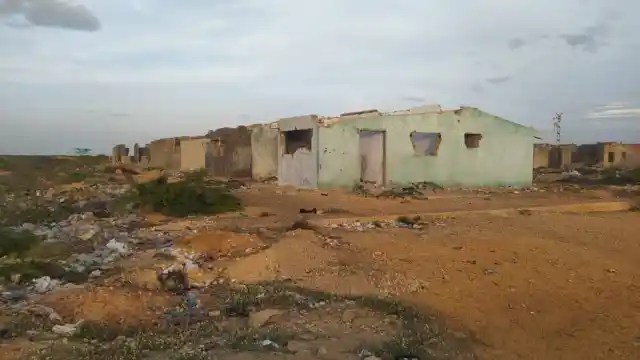
The Punta Cardón Bicentennial housing complex, which is located a few minutes from the Cardón refinery in Falcón State, was born out of the need for housing solutions for the people of Falcón through the “Gran Misión Vivienda Venezuela”. However, after more than 10 years have passed since the start of its construction, and well into its second stage, where 2,500 house structures were built, it looks like a ghost town.
Correspondent lapatilla.com
Here the construction of almost 5,000 houses was planned. In the first stage, 2,000 houses were delivered to families from different popular sectors of Falcón, but also to some who had been left homeless after the Amuay refinery explosion in 2012.
In this first stage, the unfinished housing was assigned to families and many of these decided to grab their house and finish it on their own. Because housing was assigned to people from all popular sectors, without a socioeconomic study of any kind, “Bicentenario” became the largest neighborhood in the city, and with it grew insecurity and hardship.
The second stage, where 2,500 houses distributed in blocks of 10 dwellings were built, the same thing happened as in the first. They were not finished on time and they were not delivered to their owners either, and this caused the invasion of the half finished structures that led to all the security corps to intervene to stop the invading wave.
Invaders In Action
In 2017, the houses were almost ready and that was when many homeless families invaded them and locked themselves inside with their children, but then were evicted by the regional authorities alleging that these houses already had been assigned residents.
Years passed and these dwellings were never delivered to the people who had been awarded them. This has caused that five years later this is a ghost town that serves as a den for anti socials and a garbage dump.
The houses were plundered. Doors, windows, sinks, sinks, ceilings, water pipes and electrical wiring that had already been installed were taken away. Now they are knocking down the walls to remove the metal beams that are part of the structures.
“They should have left the people who invaded them and those houses would have been useful to someone. There they are, they are no longer habitable. There were houses that were even painted. That was a great deception and damage to society,” said Marina Rojas, a resident of the area.
In the second stage of the project, the domestic gas station was also looted, stealing the pipes that were already installed, as well as the poles for public lighting that were ready to be energized.
Red zone
Despite being a relatively new housing complex, crime rates are high. In fact, it is listed as one of the most dangerous sectors of Falcón State. There are even families who abandoned their homes due to robberies, break ins and threats.
It is a place where gang leaders have been hiding. Armed confrontations are recorded almost daily, and the families that remain in the place must remain permanently inside their homes to prevent everything from being stolen. “It has gotten a little better, after everyone started leaving here. However, the houses are not alone. Here they have tied up entire families to take everything. No one leaves and no one enters after 9:00 at night,” said Agustín Medina, a resident of the first stage.
This urbanism promised to be a model for the country. It was one of the few that was born with piped gas, but it hasn’t worked for more than a year. There are sewage discharges on the main streets, public lighting is poor and many works have been put on hold, such as the construction of a school.
Needs abound in the place: unemployment is one of the biggest problems, added to the basic services and the lack of connectivity. The inhabitants cry out to the state entities for a little love for this area that currently houses more than 1,500 families.